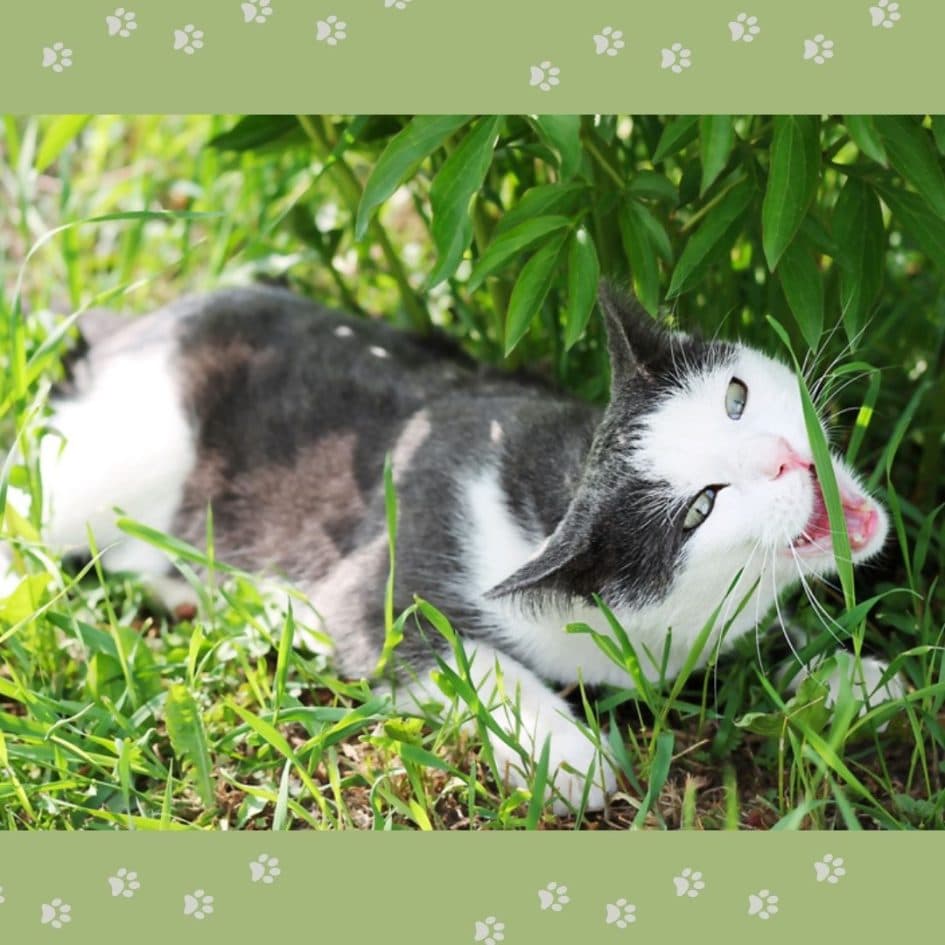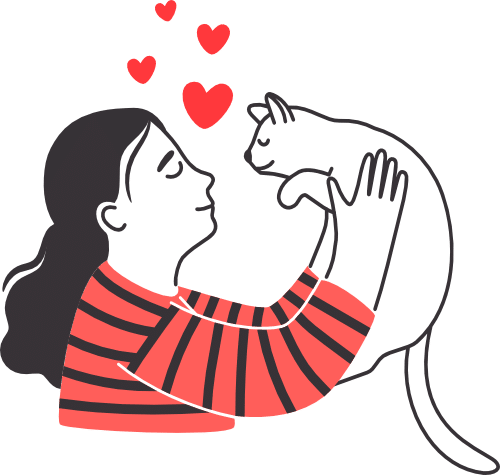

Why Do Cats Eat Grass?
It is commonly believed that the only reason that cats eat grass is to treat an upset stomach –but is that the case? Read on to find out.
A lot of people in the pet care space believe that the only reason behind a cat eating grass is inducing vomiting to treat an upset stomach. However, as per Dr. Emily Payne, this theory need not always be true.
Now, if your cat vomited every time they ate grass, then that would be a cause for concern, especially if it is happening multiple times a week. But, if your cat is eating grass without vomiting or any other gastrointestinal symptoms, then you need not be concerned.
In this blog, we will discuss some of the possible reasons that cats eat grass, and also talk about the research in this regard.
Why Do Cats Eat Grass?
Health Benefits
Grazing on grass allows cats to increase the supply of certain vitamins in their bodies. For instance, grass is rich in Vitamin B9 (Folic Acid), which helps optimize the movement of oxygen throughout the bloodstream. A lack of Folic Acid can lead to anemia; it is believed that eating grass is a cat’s way to avoid such a deficiency. There are experts who believe that grass can help treat sore throat in cats, while others think that cats nibble grass simply because they favor the texture and color.
To Improve Bowel Movements
Being a natural predator, a cat preys on smaller animals like birds and mice. This means that cats also end up eating these animals’ feathers, furs, and bones, and these can often fail to smoothly travel through the digestive tract. Hence, grass might be serving the role of a laxative, allowing cats to improve their digestion.
To Trigger Vomiting
Being carnivores, cats do not have the enzymes required to break down large quantities of grass. Therefore, cats sometime eat grass to trigger vomiting, so that they can get rid of indigestible material (like feathers and furs) from the stomach.
Anxiety
Cats, much like humans, can also resort to ‘stress eating’. In such situations, the cat is chewing on grass not to quench its hunger, but to satisfy oral fixations. When stress or anxiety rears its ugly head, cats require an outlet. While some cats become overly-vocal or start shedding excessively, others turn to different activities (such as eating grass) to try and calm themselves down. If you feel that your cat has become too aggressive or withdrawn, they might be struggling with a psychological issue and could benefit from a visit to the veterinarian.
What Does Research Say?
Like we mentioned earlier, the notion that cats eat grass only when they have an upset stomach is not always true. Perhaps the reason people believe this is that the only time they realize that their cats are nibbling on grass is when they find a green foamy mess on their rugs.
Some researchers belonging to the University of California, Davis, School of Veterinary Medicine, conducted an online survey, in which cat owners were requested to report the frequency with which their feline friends ate vegetation. The only pet parents selected for this survey were those who had observed their cat’s behavior for at least three hours each day. Any indoor-cats who did not have access to plants, and any outdoor cats whose behavior was not observable by the owners, were excluded.
The survey results were presented at the International Society for Applied Ethology’s annual meeting conducted in Bergen.
The survey included 1,021 pet parents, 71 percent of who reported that they had witnessed their feline friend consuming grass and other plants on at least six occasions throughout the animal’s lifetime, while 61 percent reported that they had noticed their cat eating grass on 10 or more occasions. Only 11 percent of the participants asserted that they had never observed their cats munching vegetation.
Most interestingly, though, on 91 percent occasions, the cats showed no signs of illness or other distresses before eating grass. Also, just 27 percent cats reportedly vomited after consuming plants or grass. As far as cats aged 3 years or below are concerned, just 11 percent vomited regularly, even though 39 percent of them ate plants on a daily basis. In comparison, 27 percent of older cats (at least 4 years old) munched grass or plants every day.
Primitive Medicine or Instinctual Behavior?
According to these results, it is highly improbable that grass is some sort of primitive feline medicine that is being used to treat an upset stomach or some other ailment. The study also disproves the hypothesis that a young cat adopts the grass-eating behavior by watching an older counterpart.
Instead, the research team thinks that grass consumption is part of an animal’s health regimen – only that a large number of companion animals need not engage in it today. Field studies conducted on primates and wild carnivores show that these animals routinely consume non-digestible vegetation to remove worms and parasites from the digestive system. According to the University of California research team, felines eat grass in order to work the muscles present in the digestive tract, and, consequently, get rid of intestinal parasites. Considering that pretty much every wild carnivore carries at least some parasitic load, instinctive and regular plant consumption helps these carnivores to keep that load down to a tolerable level – regardless of whether the animals can actually detect these parasites.
Dogs v/s Cats
The conclusion of this study is quite similar to the findings of a survey study regarding grass consumption in dogs, conducted in 2008. This study, led by Benjamin L. Hart, also revealed that dogs hardly ever displayed any signs of illness or distress prior to consuming grass. It further asserted that vomiting was quite an uncommon byproduct of vegetation consumption. The survey also discovered that the grass-eating frequency was unrelated to the dog’s overall diet or fiber consumption, thereby rejecting the theory that eating grass was a way to compensate for a dietary deficiency.
According to this study, younger animals tend to consume more grass since their immune systems have not yet become robust enough to tackle parasites. Also, nutritional stress has a more severe adverse impact on growing animals than it does on adult cats and dogs.
Hart’s team also noted that, compared to dogs, cats ate a lot less grass. This is probably because parasitic infections were less common in feline ancestors. Another reason could be that cats tend to bury and avoid each other’s feces, thereby reducing the parasitic spread. On the other hand, a dog does not mind getting into other dogs’ business.
Final Word
To sum up, the good thing is that grass consumption need not be indicative of sickness in cats or even dogs. More importantly, though, grass consumption is the kind of instinctual behavior that no animal parent, no matter how diligent, will be able to stop or modify. The solution, then, is to ensure that an indoor cat has sufficient non-poisonous, safe vegetation to munch on (cat grass, for example). This way, your cat will not be tempted to sneak outside and nibble on any outdoor plants that contain herbicides, pesticides, or any other chemicals used to treat the plants.
And if your kitty does end up throwing up on your kitchen floor, consider it a tiny price to pay for having a cat in your life.
Discover how to create a joyful, healthy home for your pet.
Subscribe to your weekly rundown of practice, real life ideas and training tips straight to your inbox.


